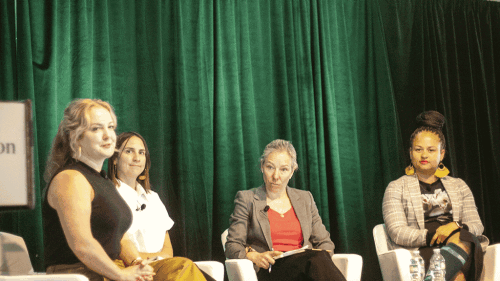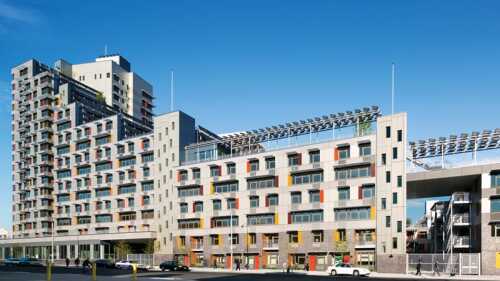Developers of master-planned communities (MPCs) must prepare for the next generation of buyers who will be more sophisticated and more discerning because they will come from urban environments, attendees were told at the 2017 ULI Spring Meeting.
“It’s a shifting table for residential development,” explained Lisa Bate, regional managing principal for North America, based in the Toronto studio of B+H Architects. “Today, people are seeking affordability, accessibility, green space, recreation, access to healthy food, and entertainment. They are not so scared of the height of buildings anymore if it gets them 24-hour amenities, access to pedestrian experiences, views, and sunlight at grade.”
Bate spoke at the “Master-Planned Community Dynamics: Urban Infill vs. Greenfield Approaches” panel at the Spring Meeting, chaired by Richard M. Gollis, principal at the Concord Group, a real estate advisory services firm headquartered in Newport Beach, California.
He noted that master-planned communities have a long life, adding that it often takes many years to season the process. “As we invest in projects toward buildout,” he asked, “how are we driving market share and dealing with the consequences of a changing marketplace over many cycles? We have to future-proof five, ten, 15 years down the line.”
As with most sectors of real estate, millennials are changing the design of master-planned communities with their desire to be ecofriendly and walkable. “They want an urban experience around a suburban setting,” Bate added. “It’s a triple bottom line—environment, social, and financial.”
Bate noted that Microsoft is headquartered in Redmond, Washington, which is basically a town within the software giant’s 120-building campus where 86 percent of residents are homeowners.
“The company’s expansion has transformed the whole community into something that supports both Redmond and Microsoft and caused a new reality,” she added. “The company has you in a community and space where you can work, play, collaborate, live, and learn. When we look at how content people are with the situation, it is amazing. Demographics show how incredibly popular the concept is, and people are saying the situation of living close to work enriches their lives.”
In contrast to the past, a time when homebuyers wanted their own space, future buyers in master-planned communities will want everything closer. “People want density, they don’t mind living in a certain place as long as they have access to walkability, amenities, and leisure around them,” she added.
Mark G. Bulmash, senior vice president of development at the Howard Hughes Corporation, a publicly traded real estate development company that owns, manages, and develops commercial, residential, and mixed-use property across the United States, including MPCs, says that entrepreneurs must develop as the market allows “in digestible bites.”
Bulmash added that Hughes takes the same holistic approach with both master-planned communities and mixed-use urban infill projects, looking to maximize the experience for residents, office workers, and the broader community.
“Most urban master-planned infill projects are about redevelopment,” he reminded his audience. “The preexisting context is usually more defined and constrained than a master-planned community that evolves over time in a greenfield. In urban areas, the market really drives the program and placemaking is a key differentiator.
“Responsible placemaking requires a thoughtful exploration and understanding of the variety of experiences and places that make up a successful mixed-use community,” continued Bulmash. “We fundamentally believe that vibrant mixed-use communities are what people will increasingly seek moving forward; and that when you curate a series of memorable experiences, the sum is greater than the individual parts.”
Affordability is incredibly important nowadays, Bulmash added. “Since 2000, real income for the younger generations has been decreasing, which is driving the sharing economy,” he added. “Sharing is done out of necessity. Because of higher debt and lower incomes, many young people can’t afford to buy cars and they put off major life decisions such as getting married and buying a home. So the industry will need to deal with these challenges as it faces an increasingly sophisticated customer base, people who don’t necessarily see housing as an investment like older generations have.”
That is why brand positioning is important, whether the community is an urban infill or a greenfield master-planned development, said Vanessa Rose, chief executive officer of the Voyager Group in Laguna Beach, California, which creates brand narratives and stories.
“It’s about positioning the brand first,” she said. “This will reveal the central guideposts for storytelling. Engaging creative and media helps define the community narrative, but the principles are the same regardless of location. Execution of the message—that is what’s unique. Communities need a point of view to create an emotional connection with the audience.”
She added that the effort must be inclusive, not exclusive, providing high-touch as well as high-tech moments whether greenfield or urban infill. “It’s taking practices of suburban development and placing them into a local project in a compressed urban setting,” she added.




